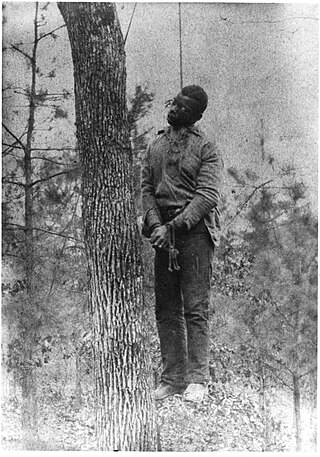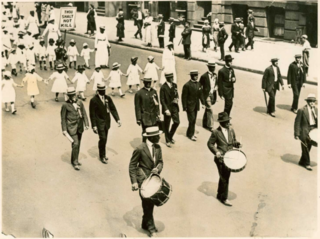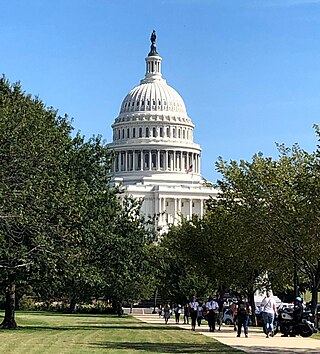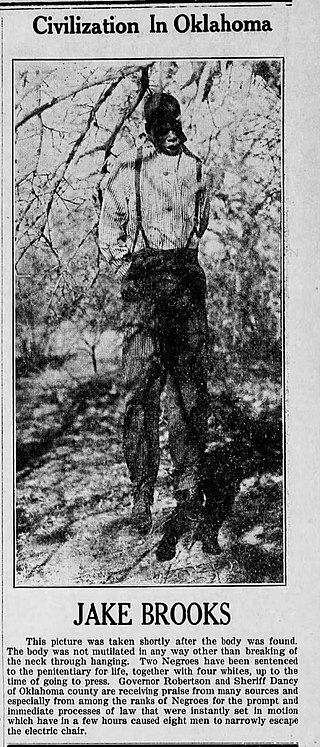
Bobby Lee Rush is an American politician, activist and pastor who served as the U.S. representative for Illinois's 1st congressional district for three decades. A civil rights activist during the 1960s, Rush co-founded the Illinois chapter of the Black Panther Party.

The Unborn Victims of Violence Act of 2004 is a United States law that recognizes an embryo or fetus in utero as a legal victim, if they are injured or killed during the commission of any of over 60 listed federal crimes of violence. The law defines "child in utero" as "a member of the species Homo sapiens, at any stage of development, who is carried in the womb."

The Dyer Anti-Lynching Bill (1918) was first introduced in the 65th United States Congress by Representative Leonidas C. Dyer, a Republican from St. Louis, Missouri, in the United States House of Representatives as H.R. 11279 in order “to protect citizens of the United States against lynching in default of protection by the States.” It was intended to establish lynching as a federal crime. The Dyer Anti-Lynching Bill was re-introduced in subsequent sessions of United States Congress and passed, 230 to 119, by the House of Representatives on January 26, 1922, but its passage was halted in the United States Senate by a filibuster by Southern Democrats, who formed a powerful block. Southern Democrats justified their opposition to the bill by arguing that lynchings were a response to rapes and proclaiming that lynchings were an issue that should be left for states to deal with.

Lynching was the widespread occurrence of extrajudicial killings which began in the United States' pre–Civil War South in the 1830s and ended during the civil rights movement in the 1950s and 1960s. Although the victims of lynchings were members of various ethnicities, after roughly 4 million enslaved African Americans were emancipated, they became the primary targets of white Southerners. Lynchings in the U.S. reached their height from the 1890s to the 1920s, and they primarily victimized ethnic minorities. Most of the lynchings occurred in the American South, as the majority of African Americans lived there, but racially motivated lynchings also occurred in the Midwest and border states. In 1891, the largest single mass lynching in American history was perpetrated in New Orleans against Italian immigrants.

The Violence Against Women Act of 1994 (VAWA) is a United States federal law signed by President Bill Clinton on September 13, 1994. The Act provided $1.6 billion toward investigation and prosecution of violent crimes against women, imposed automatic and mandatory restitution on those convicted, and allowed civil redress when prosecutors chose to not prosecute cases. The Act also established the Office on Violence Against Women within the U.S. Department of Justice.

The Matthew Shepard and James Byrd Jr. Hate Crimes Prevention Act is a landmark United States federal law, passed on October 22, 2009, and signed into law by President Barack Obama on October 28, 2009, as a rider to the National Defense Authorization Act for 2010. Conceived as a response to the murders of Matthew Shepard and James Byrd Jr., both in 1998, the measure expands the 1969 United States federal hate-crime law to include crimes motivated by a victim's actual or perceived gender, sexual orientation, gender identity, or disability.

Randal Howard Paul is an American politician serving as the junior United States senator from Kentucky since 2011. A member of the Republican Party, he is a son of former three-time presidential candidate and 12-term U.S. representative from Texas, Ron Paul. Paul describes himself as a constitutional conservative and supporter of the Tea Party movement.

Thomas Harold Massie is an American politician, entrepreneur, and engineer. A member of the Republican Party, Massie has been the United States representative for Kentucky's 4th congressional district since 2012, when he defeated Bill Adkins in the special and general elections. The district covers much of northeastern Kentucky, but is dominated by the Kentucky side of the Cincinnati area and Louisville's eastern suburbs.

The anti-lynching movement was an organized political movement in the United States that aimed to eradicate the practice of lynching. Lynching was used as a tool to repress African Americans. The anti-lynching movement reached its height between the 1890s and 1930s. The first recorded lynching in the United States was in 1835 in St. Louis, when an accused killer of a deputy sheriff was captured while being taken to jail. The black man named Macintosh was chained to a tree and burned to death. The movement was composed mainly of African Americans who tried to persuade politicians to put an end to the practice, but after the failure of this strategy, they pushed for anti-lynching legislation. African-American women helped in the formation of the movement, and a large part of the movement was composed of women's organizations.

Rand Paul is a member of the Republican Party, a U.S. Senator representing the state of Kentucky since 2011, and a former candidate for president of the United States. His voting record was rated 26% liberal in 2011 by National Journal.

The 117th United States Congress was a meeting of the legislative branch of the United States federal government, composed of the United States Senate and the United States House of Representatives. It convened in Washington, D.C., on January 3, 2021, during the final weeks of Donald Trump's presidency and the first two years of Joe Biden's presidency and ended on January 3, 2023.

Donald John Bacon is an American politician and retired military officer serving as the U.S. representative for Nebraska's 2nd congressional district since 2017. Before holding public office, he was a United States Air Force officer, retiring as brigadier general with stints as wing commander at Ramstein Air Base, Germany and Offutt Air Force Base in Omaha, Nebraska, prior to his retirement from the military in 2014. His political constituency now includes all of Omaha and the areas surrounding Offutt.
The Emmett Till Unsolved Civil Rights Crime Act is an Act of the United States Congress introduced by John Lewis (GA-5) that allows the reopening of cold cases of suspected violent crimes committed against African Americans before 1970. The U.S. House of Representatives passed the legislation on June 20, 2007, by a vote of 422 to 2. The U.S. Senate passed the legislation on September 24, 2008, by unanimous consent, and President George W. Bush signed the bill into law on October 7.

The Freedom to Vote Act, introduced as H.R. 1, is a bill in the United States Congress intended to expand voting rights, change campaign finance laws to reduce the influence of money in politics, ban partisan gerrymandering, and create new ethics rules for federal officeholders.

The Justice for Victims of Lynching Act of 2018 was a proposed bill to classify lynching a federal hate crime in the United States. The largely symbolic bill aimed to recognize and apologize for historical governmental failures to prevent lynching in the country.

The George Floyd Justice in Policing Act of 2021 was a policing reform bill drafted by Democrats in the United States Congress. The legislation was introduced in the United States House of Representatives on February 24, 2021. The legislation aims to combat police misconduct, excessive force, and racial bias in policing.

Andrew Scott Clyde is an American politician and gun store owner from the state of Georgia. A Republican, Clyde represents Georgia's 9th congressional district in the United States House of Representatives, assuming office in 2021. The district serves a large swath of exurban and rural territory northeast of Atlanta, including Gainesville, Toccoa, Hartwell and Dahlonega.

The lynching of Jake Brooks occurred in Oklahoma City, Oklahoma on January 14, 1922.

The Creating a Respectful and Open World for Natural Hair Act of 2022 was a bill in the United States Congress intended to prohibit discrimination based on an individual's hair texture or hairstyle by classifying such discrimination illegal under federal law. It applied to federally assisted programs, housing programs, public accommodations, and employment. The act was introduced in the House of Representatives by Congresswoman Bonnie Watson Coleman (D-NJ) on March 19, 2021. Senator Cory Booker (D-NJ) introduced a companion bill in the Senate on March 22, 2021. The CROWN Act of 2022 marked the second time the legislation was introduced in Congress.













